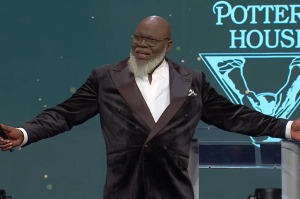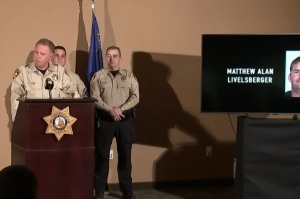Interview with a Premillennialist, Dr. Darrell Bock
Editor's note: This interview with Dr. Darrell Bock is part of a two-part series looking at the dominant end-time views on the last millenium
To Evangelicals, ''the millennium'' refers to the thousand-year period of Christ's rule as mentioned in the Book of Revelation. While most Evangelicals agree the millenium will certainly come, they differ in their understanding of Christ's return.
Premillenialists believe Christ will come before the millenium while post-millenialists believe He will come after the 1,000-years.
The following is an interview with Dr. Darrell Bock, a leading premillennialist.
What is dispensational premillennialism? Are there variations to this view?
First, when Jesus comes for the church and the believers in relation to the tribulation period, there will be an intense suffering because it’s the time of divine judgment in the world.
Premillennialists believe it covers a seven-year period after the church has been raptured to heaven and ends in Jesus' return. There’s pre-, mid-, and posttribulation, so the view that Jesus comes before the millennium starts is pretribulationism, the view that he comes in the middle of that period is the midtribulationism, and he comes at the end of the tribulation is posttribulationism. So the return of Christ for believers and his return to the earth happen at the same time.
Dispensationalism tends to be premillennial and pretribulational because it argues that there’s a distinction between the church and Israel in the program of God. When God returns to work more directly with Israel, the church would have been removed. The rapture, when believers go to meet the Lord, takes place before the tribulation.
Tribulation period has primarily to do with God’s work to restore Israel today. Historic premillennialism tends to be posttribulational, meaning, when Jesus returns, believers meet him at the same time he comes back after the tribulation.
What are the critical end-time events according to the premillenialist view? Do historic and dispensational views share the same chronology?
The basic outline of the events is:
1) Rapture of the church
2) Coming of the antichrist
3) Peace treaty with Israel that later is broken that comes in the 7 year period of tribulation
4) Intense world conflict and divine judgment
5) Second coming of Jesus
Historical premillennialists generally do not place the rapture at the start as they tend to be postribulational and they also are less specific about the second and third events. They simply see an intense period of earthly conflict and divine judgment and may not see a special role for Israel in this time period.
What are the different views on tribulation?
Premillennialists believe it covers a seven-year period after the church has been raptured to heaven and ends in Jesus' return.
Midtribulationists believe that the delivering of the church happenings in the middle of that period. Posttribulationists believe it happens at the end with Jesus' second coming to earth.
What passages lead you to dispensational premillennialism? Where does nation of Israel come in?
The most important passage is probably from 1 Thessalonians 4:15 to the end, in which there’s a discussion about meeting the Lord in the air and the next chapter discusses issues on antichrist, a part of tribulation period. If you take those two chapters in sequence, then the return of the Lord for believers would come before the antichrist experience and the second coming really is a coming to earth to deal with the evil that’s associated with antichrist. (1Thessalonians 5:1-10)
Nation of Israel comes in because in Daniel 9, the last week of 70 weeks mentioned is the seven-year tribulation period. The Messiah is cut off after week sixty nine and this is seen as referring to Jesus' first coming and death. That leads to one week left [a seven year period] out of the seventy yet to be fulfilled because the entire prophecy is about Israel.
That last week is tied to the coming of the antichrist, which, because of the book of Revelation, especially Revelation 20, is seen as describing the final events of tribulation.
Also, Paul speaks of the church as a mystery in God's program in Ephesians 3:3-6 and in Colossians 1:24-27, specifically noting that the unity of Jew and Gentile in Christ is a new revelation, having been hidden from the times. So the institution of the church is not discussed specifically in the Old Testament. It is a new institution of God functioning in this dispensation. [A dispensation is a time period or a stewardship of time.]
So the current period is the period of the church and the church is not the nation of Israel, who functioned as the focus of the people of God in the Old Testament. In the future God will work through an institution known as the millennial kingdom [often simply called the millennium] with Christ ruling for a 1000 years from the earth (Revelation 20:1-6). The differing nature of these structures God works and the time periods to which they belong make for the dispensations of dispensationalism.
Additional comments?
It is important to say that in the midst of all these discussions about the end among Christians two things are important to observe: (1) everyone agrees that one day Jesus will return and judge the earth and that all will be accountable to him and (2) that God has made it clear in Acts 1:6-8 that the focus of the church, as it awaits the completion of God's program and the return of Jesus, is to accomplish the mission of taking the message of Christ into all the world as an extension of the witness of the apostles Jesus commissioned in Acts 1.
Dr. Darrell L. Bock is Research Professor of New Testament Studies at Dallas Theological Seminary in Dallas, Texas and serves as Professor for Spiritual Development and Culture for the Seminary's Center for Christian Leadership. His special fields of study involve hermeneutics, the use of the Old Testament in the New, Luke-Acts, the historical Jesus, and gospels studies. He is a graduate of the University of Texas (B.A.), Dallas Theological Seminary (Th.M.), and the University of Aberdeen (Ph.D.).
He recently completed a year of post-doctoral study at the University of Tübingen as an Alexander von Humboldt scholar, where he produced a monograph on Jesus' trial entitled Blasphemy and Exaltation in Judaism and the Final Examination of Jesus.
Bock has written of a number of books and articles and serves as a corresponding editor for Christianity Today and Past-President of the Evangelical Theological Society. He's an elder at Trinity Fellowship Church in Richardson, Texas.





























